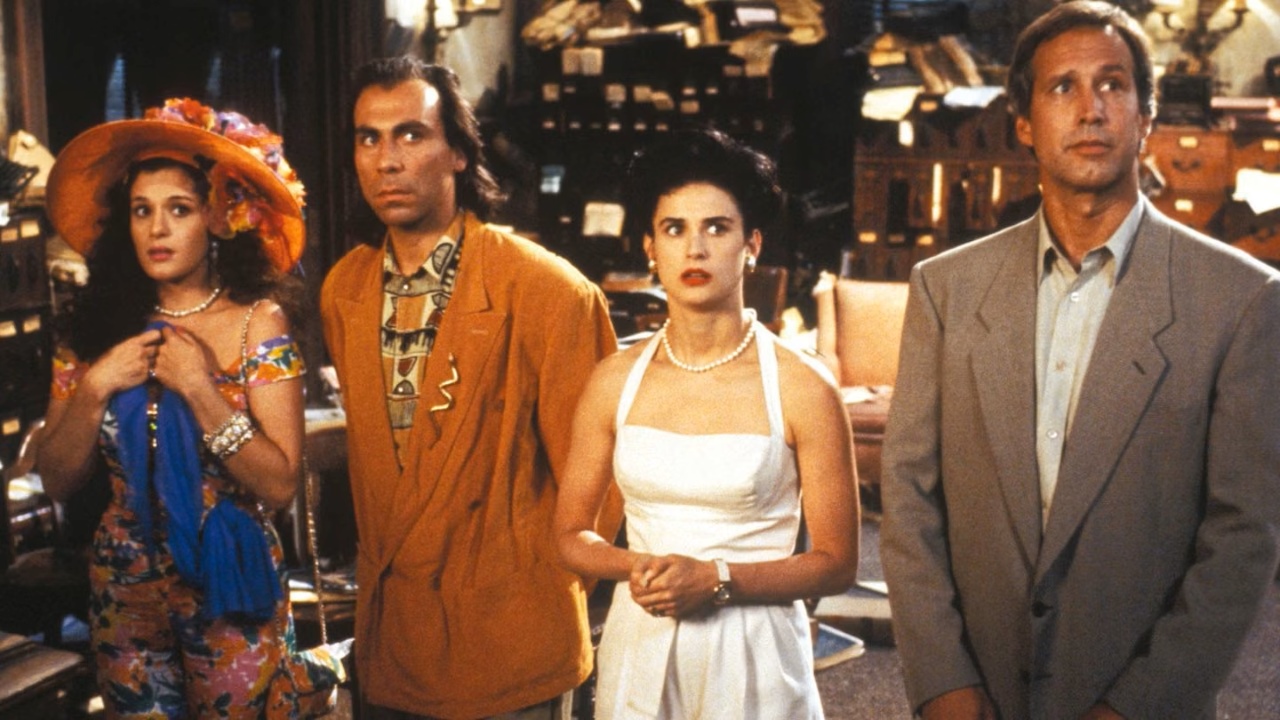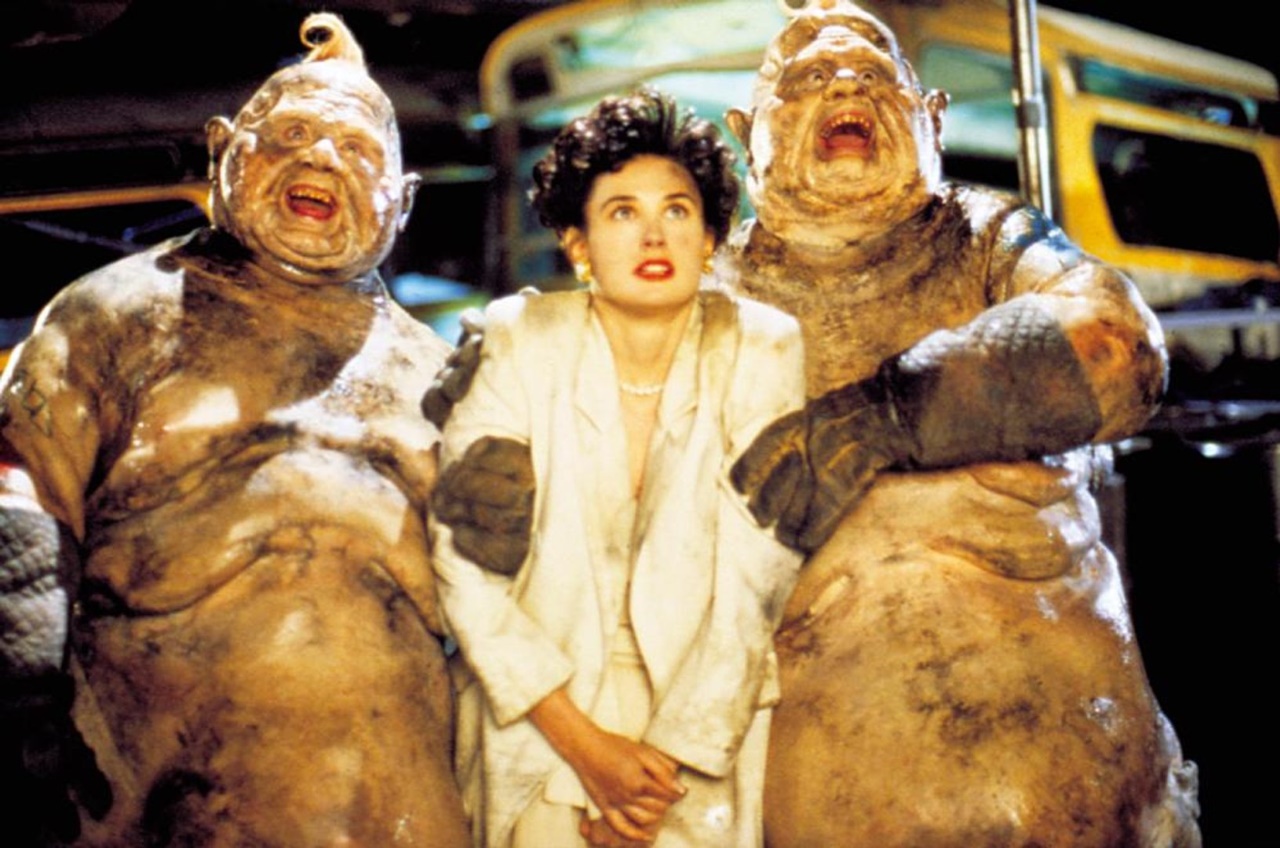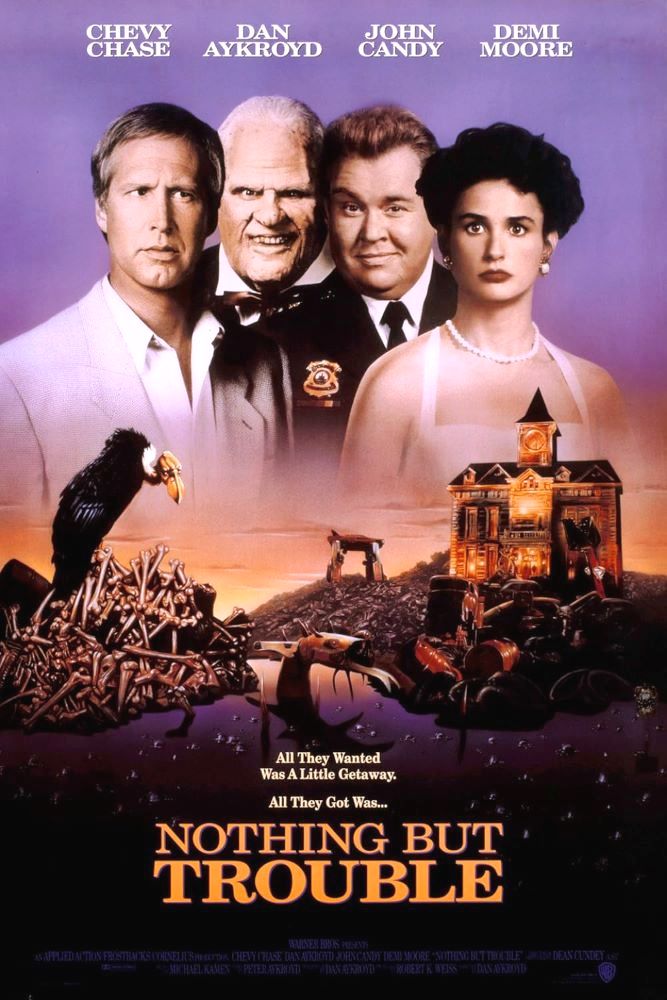USA. 1991.
Crew
Director/Screenplay – Dan Aykroyd, Story – Peter Aykroyd, Producer – Robert K. Weiss, Photography – Dean Cundey, Music – Michael Kamen, Miniature Effects – Apogee Productions, Inc., Special Effects Supervisor – Michael Lantieri, Makeup Effects – David B. Miller, Production Design – William Sandell. Production Company – Applied Action.
Cast
Chevy Chase (Chris Thorne), Dan Aykroyd (Judge Valkenheiser/Bobo), Demi Moore (Diane Lightson), John Candy (Dennis Valkenheiser/Eldona Valkenheiser), Taylor Negron (Fausto), Bertila Damas (Renalda), Valri Bromfield (Miss Purdah), John Daveikis (L’il Debbull), Daniel Baldwin (Dealer #1)
Plot
Chris Thorne, a financial publisher in New York City, is taken by Diane Lightson, a new neighbour in his apartment building, and volunteers to drive her to Atlantic City to put a stop to business double-dealings by her ex. Fausto and Renalda, two of Chris’s Brazilian clients, insist on inviting themselves along too. A detour off the New Jersey Turnpike takes them through the small town of Valkenvania where they are arrested for going through a stop sign. They are dragged before the aging Judge Valkenheiser where they learn that in Valkenvania the penalty for speeding and other small such infractions is death. With the judge’s huge, overweight niece Eldona setting her sights on marrying Chris, they try to escape in a harried race through the town’s rickety junkyard filled with homemade deathtraps.
Dan Aykroyd is a key name in popular culture for anyone who lived in the 1980s. Born in Canada, Aykroyd started out a member of the influential Second City comedy troupe and then gained exposure on Saturday Night Live (1975– ). Film audiences discovered him through his third film role in the cult hit of The Blues Brothers (1980), which was developed out of a Saturday Night Live sketch. Aykroyd went onto a series of popular comedy roles throughout the next decade in the likes of Trading Places (1983), Ghostbusters (1984), Spies Like Us (1985), Dragnet (1987), My Stepmother is an Alien (1988), Loose Cannons (1990) and Coneheads (1993). Nothing But Trouble was his one and only outing as director, although he had also written The Blues Brothers, the Ghostbusters films, Spies Like Us and Dragnet.
Nothing But Trouble is a very strange film. Akyroyd claims that it was based on a real-life experience that happened to him after he was arrested for speeding in a small US town and dragged before an aging judge in the middle of the night. On screen, Nothing But Trouble comes across very much as a vanity production. It has the feel of a vehicle where Akyroyd has written parts so that he can get together with his comedy buddies and have fun. Aykroyd himself assumes multiple roles throughout – as both director, writer and playing two of the parts on screen. The film was made on a then substantial $40 million budget but was a huge box-office flop, earning less than a quarter of that. It was critically trashed and nominated for six Golden Raspberry Awards, including Worst Film and Akyroyd for Worst Director and Worst Supporting Actor, he winning for the latter.
Nobody – either critics, audiences or the film’s marketing department – knew how to get a handle on Nothing But Trouble. Conceptually, it feels like a crazed collision between Terry Gilliam’s Brazil (1985) and The Texas Chain Saw Massacre (1974) and the whole school of Backwoods Brutality films. The best thing about the film is the sets – a sprawling junkyard and a rundown American Gothic house over-filled with junk where everything opens up into rickety traps and ramshackle devices – the Judge being winched down the dinner table on a makeshift lift, the condiments being delivered around the table by a model train, moving platforms that wheel victims off from the courtroom into The Bonestripper, which has been designed as a rollercoaster/funhouse that grinds victims up and spits their cleaned bones out at a target at the other end.


However, it seems an idea that Akroyd frequently allows to wander away from itself. The point of two obscenely fat creatures in diapers (one of which is played by Aykroyd) is unclear. A sequence where the film is taken over by a hip-hop band with Aykroyd’s Judge accompanying them on the organ is awful (although the band does have the novelty of including a then unknown Tupac Shakur as one of its number). Much of the film involves Chevy Chase and Demi Moore running around the house/junkyard trying to avoid traps and recapture.
I think I would have liked Nothing But Trouble far more if Dan Aykroyd had made it as a pure horror film, pushed it over into something gory or even blackly funny in the vein of say The Texas Chainsaw Massacre 2 (1986), which has a number of similarities to this. Instead, due to Aykroyd’s background, we get something that is played as a comedy that stumbles into occasional moments of horror. The upshot is of a film that has wandered into a strange headspace almost by accident and never seems sure of what it is doing when it gets there.
I have always found Chevy Chase a smugly annoying screen presence. Here he passes through the film with a glib smile delivering a series of quips that only he seems to find funny. Demi Moore, one of the most popular actresses of the 1990s, a slick Yuppie with classical looks and little depth, is in a role where all she is required to do is scream. Akyroyd casts himself and John Candy in double roles but, beyond the effectiveness of the makeup, it seems a waste of effort and talent. You can also spot a young Daniel Baldwin in a minor role as a drug dealer who is hauled up before the judge.


